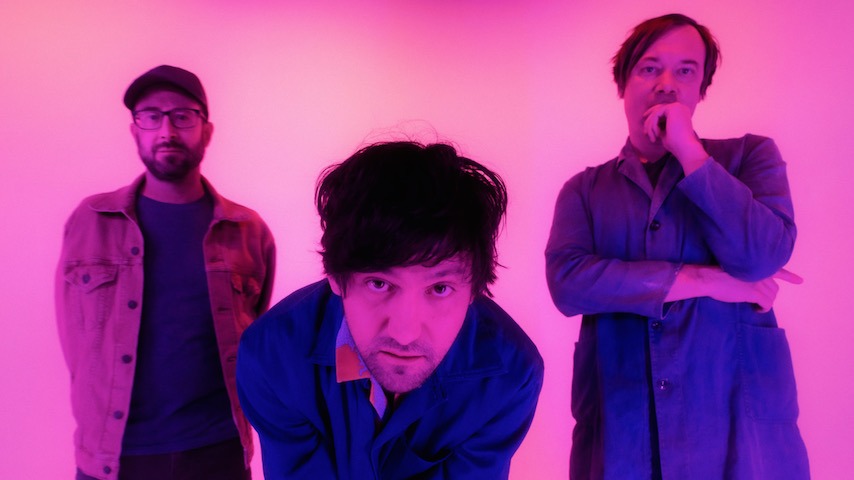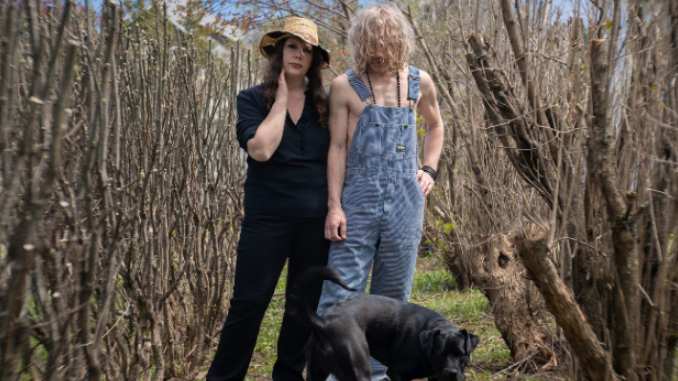The beginning of a Bright Eyes record is often the most interesting part. Perhaps most famously, 2005’s seminal I’m Wide Awake, It’s Morning opens with a tale told by frontman Conor Oberst about a doomed airplane, which then rolls into the manic folk-rock song “At the Bottom of Everything.” 2000’s Fevers and Mirrors, now considered emo canon, begins with an eerie recording of a child reading a short passage from a book about a dinosaur named Mitchell. A lopsided orchestra tune-up and a spoken-word vignette introduce listeners to 2007’s Cassadaga. And for 2011’s The People’s Key, a fellow by the name of Danny Brewer drones on about a series of outlandish conspiracy theories. Each opening montage is kind of like the dark tunnel at the start of a Disneyland ride: a cryptic introduction to whatever vibrant world Bright Eyes have created within that record.
Bright Eyes’ new album and first since The People’s Key opens, of course, with another one of these introductory calling cards. But this time is different, because the opening sequence isn’t delivered by a band member or even a stranger on some dug-up archival audio. Down in the Weeds, Where the World Once Was starts with another of these “sound collages,” as Oberst puts it, narrated by his ex-wife Corina (“She actually was just here a second ago, still like my best friend,” Conor says during a Zoom call from his house in Omaha) and his mother. It also features a ragtime melody composed by Bright Eyes bandmate Nathaniel Walcott and performed by a mix of friends one weekday night at Pageturners, Oberst’s bar in Omaha. It’s a lot to process—the pleasant bustle of bar noise and jaunty keys are paired with Oberst’s mother’s somber recollections on his brother who passed away a few years ago—but these varying moods are a perfect set-up to the record that follows.
“I liked the sound of both of their voices,” Oberst says. “And obviously some of the things they’re talking about are kind of heavy, but I guess it’s trying to get both those competing feelings blended together, and that felt like a good doorway into the record.”
Down in the Weeds, like every Bright Eyes album that came before it, holds multiple, sometimes contradictory, ideas at once. There are both resounding moments (the bagpipes played by a group called Omaha Pipes and Drums, whose ordinary gigs mostly consist of “funerals and parades,” as Oberst described—on lead single “Persona Non Grata” come to mind), and plenty of grim ones (Oberst has long been comfortable writing about grief). But that doesn’t mean Oberst, Walcott and their bandmate Mike Mogis want you to be strictly miserable while listening to these 14 new songs—even if Bright Eyes have a reputation for anguish.
“I’ve always just tried to, as best I can, articulate the human experience and how we all know the full spectrum of feelings,” Oberst says. “And as you go through your life, there’s obviously so many ups and downs, and I think that’s what it is to be a human. And I’ve always tried my best to do that. And maybe I’ve leaned a little too hard on the dark side.” He starts to trail off, adding, “Maybe I’ve been on the heavier side of the seesaw or whatever, but, I don’t know…”
Oberst is acknowledging 20-plus years of dark music. Whether it’s with Bright Eyes, his own folk-leaning solo recordings or one of his other bands or projects (most recently his 2019 collaboration with mentee and current indie-folk monarch Phoebe Bridgers, Better Oblivion Community Center), Oberst has always had a flair for despair. It’s a good thing, then, that Walcott and Mogis design such buoyant compositions. They’re the “bright” in Bright Eyes.
And Down in the Weeds is full of these gigantic sonic moments—elated electric guitars ring out loud and clear as Oberst delivers one of the album’s more hopeful lines (“Got to keep on going like it ain’t the end / got to change like your life is depending on it”) on “Dance and Sing,” chipper drum machines reminiscent of a certain Drake song keep time on “Pan and Broom” and jammy keys and a gospel choir dominate “Forced Convalescence.”
There was nothing “forced” about the end of Bright Eyes’ unofficial dormancy, though. What looked like a reunion to fans was really just a matter of good timing—the band never split up, they were just focused on different projects in the interim since The People’s Key. Mogis was busy producing records for bands like First Aid Kit, and Walcott was writing film scores and touring with the Red Hot Chili Peppers, whose frontman Flea actually plays bass on Down in the Weeds. Then, at the end of 2017, schedules aligned, and all three guys were on board for another Bright Eyes album.
The timing of this record is both good and bad, of course. 2020 was already a landmark year for the band: I’m Wide Awake, It’s Morning and Digital Ash in a Digital Urn both turned 15 in January, and Fevers and Mirrors turned 20 in May. After signing with a new label (Dead Oceans), the band had an entire year-and-a-half of touring and release promo planned. But those plans, including an international tour, dissolved at the start of the pandemic. They decided to release the album anyway.
“I still wish we could be out there, but we’re so lucky to have jobs that we can kind of do this way,” Oberst said. “We have roofs over our heads and we have money, and with what everyone else is going through, I think the world can live without rock shows for a little while.”
The resulting record features Oberst’s characteristically detailed songwriting, but the creative process behind the music was much more collaborative than on albums past. Down in the Weeds feels like the quintessential Bright Eyes record, but, at the same time, there’s a new energy coursing through it.
“We went about it a little bit differently with this one in that we were all kind of starting with ideas that we all were bringing in and putting them together in a collaborative sense,” Walcott says. “So that definitely led, to some degree, to a little bit of a newness in the sound here and there in a somewhat subtle way, because we didn’t want it to sound totally out of place in the context of Bright Eyes.”
“I think there was some kind of conscious effort to have some familiar touchstones to other albums,” Mogis adds. “And there’s something kind of nostalgic about it that’s even comforting to us to some degree, or at least to me.”
There are nostalgic sounds at play on Down in the Weeds as well as new emotions. Walcott mentions implementing the hammer dulcimer, which he most associates with “old Bright Eyes stuff.” Thematically, it’s certainly not Bright Eyes’ “first trip down an apocalyptic soapy road,” as Oberst puts it, but it’s still impossible to listen to the album outside of the context of a bleak 2020. It’s almost like the moment meets the music, as opposed to the other way around.
“I think lyrically it’s not trying to pretend that time hasn’t passed,” Oberst says of the album. “It reflects where we’re at right now.”
But some things never change. “I’ve been writing songs about death since I was like 12-years-old,” Oberst says. Yet, any token Bright Eyes gloominess on Down in the Weeds seems balanced by a cautious optimism. Oberst closes “Forced Convalescence,” which could easily be read as a stuck-at-home quarantine anthem, with the line “I’m overcome with love / inter-dimensional, no obstacles / mountains and dust.” If that sounds rather romantic, it should come as no surprise that Oberst was trying his hand at poetry around the time of recording. In fact, the album’s title is taken from a poem/flip book combo he was working on in memory of his late brother.
“On each page you’d have to go through it slowly to read the poem,” Oberst says of the project. “And it was just going to be this kid pulling one of those horses with the wheels on it, and then at the end, he climbs onto it and they fly away. But I just quit after a certain point because I don’t know if I’m supposed to write poetry, realizing it’s not the same thing as songs. Anyway, I got discouraged, ditched that project, but, [Down in the Weeds, Where the World Once Was] was the name of it. And so when we started making the record and realizing some of these themes and things were similar, I thought, well, maybe just use that title for the record. ‘Cause I don’t know if this flipbook’s ever gonna get off the ground. No pun intended.”
Bright Eyes are a gracious bunch. At one point, when probing Oberst about the meaning behind powerhouse synth-pop single “Mariana Trench,” he replied, “You would probably know what it’s about more than I would.” Read old interviews, and you’ll discover Oberst has never been high-and-mighty or possessive about his songs and their origins. Take them as you will.
But Down in the Weeds, in spite of its topical, anxious themes, wasn’t inspired by 2020. However, if this album helps you make sense of all the pain and chaos the year has brought and look to new beginnings, then by all means, cling away. You have Oberst’s full support.
“A lot of it’s about resilience and acceptance and the fact that your two choices are to keep going or to give up, and [it’s] probably better to keep going.”
Down in the Weeds, Where the World Once was is out this Friday, Aug. 21 on Dead Oceans. Pre-order the album here.
Ellen Johnson is an associate music editor, writer, playlist maker, coffee drinker and pop culture enthusiast at Paste. She occasionally moonlights as a film fan on Letterboxd. You can find her tweeting about all the things on Twitter @ellen_a_johnson.




